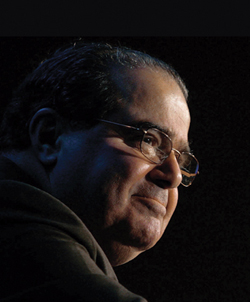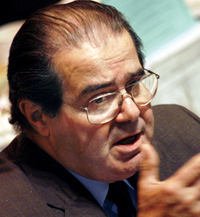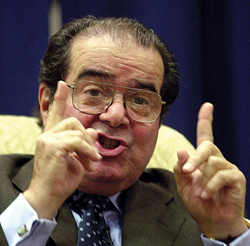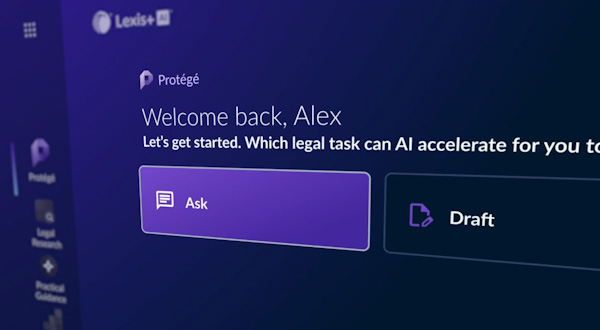A Voice for the Write

Antonin Scalia.
Photo by Alex Wong/Getty Images
When legal writing expert Bryan A. Garner set out to interview all nine U.S. Supreme Court justices for his website, at lawprose.org, he found one justice particularly compatible: Antonin Scalia. “I found on a personal level that he and I clicked,” says Garner.
Measured only by their contrasting voices, they seem an unlikely duo: Dallas native Garner’s broad Texas drawl, Scalia’s lively New York-bred tempo.
But they are united in their devotion to the written and spoken word—no matter the accent.
The result: Their just-published collaborative tutorial, Making Your Case: The Art of Persuading Judges.
In March, the ABA Journal’s Richard Brust sat down with Scalia in the Supreme Court’s Lawyers’ Lounge—joined by Garner in teleconference—to talk about writing and oral argument. Highlights of that conversation appear below.
Garner, a former writing instructor at the University of Texas and Southern Methodist University law schools, is editor-in-chief of Black’s Law Dictionary.
Scalia, who joined the court in 1986, has long been regarded among its most erudite. He’s been a law professor, headed the Justice Department’s Office of Legal Counsel and served as a federal appellate judge.
An active ABA member before his elevation to the Supreme Court, Scalia chaired the Section of Administrative Law and Regulatory Practice in 1981-82. He also served as chair in 1982-83 of the ABA Section Officers Conference.
ABA JOURNAL: Why another book about advocacy and argument?
SCALIA: Well, obviously because we thought we had some things to contribute that we thought earlier books did not. And it would be a shame to have all of that knowledge go to the grave with us.
GARNER: It’s not just a book about Supreme Court advocacy at all. It’s about advocacy in courts at all levels, anywhere. And some of the great insights of Justice Scalia are about Supreme Court advocacy. But we both purposely broadened it to deal with trial courts and intermediate appellate courts as well.
S: And my experience is not just on the Supreme Court but on the court of appeals for four years. Both of us consulted a large number of friends who are advocates or judges on lower courts. So, Bryan is quite right. It’s not just about Supreme Court advocacy. In fact, one of the hard parts about writing the book was making sure that the things we said would be applicable to all three levels of courts, and to say so when it was not applicable to all three.
ABAJ: What would the quality of advocacy be like if people were following your book? What sorts of things would lawyers be doing, having read the Scalia and Garner book, that they haven’t been doing before?
S: Well, they would be a lot more brief. One of the main—and this is not a novel recommendation by any means—but one of the pieces of advice that almost any judge will give you is that lawyers go on for too long, and when they do it doesn’t help their case.
G: And I might say that we have tried to give nuts-and-bolts advice on how to be brief. Not just exhortations to be brief, but how to frame an argument that is much more focused. From my point of view, you would have briefs that are much more polished and cogent, and oral arguments that are much more polished and professional.
It’s not to say that advocacy is really poor in this country, but my own view is that it is mediocre in most of our federal courts and state courts. And advocates have a long way to go to come up to the level where they’re going to be as much of a help to the courts as possible.
S: You know, I guess in the strict sense advocacy like everything else will always be mediocre, if by mediocre you mean average. Our hope is to raise the average. It reminds you of that little town in Minnesota where all the children are above average. It’s impossible to have everybody above average, but we hope to raise the average.
ABAJ: How important is it to understand what is going on in the judge’s mind? Is that something we should be thinking about as an advocate in brief writing and oral argument?

Antonin Scalia.
Chip Somodevilla/Getty Images
S: That’s not distinctive to argument in the form of the courts. In any argument, in trying to persuade anyone, step No. 1 is way up in the front of our book. Know your audience. That’s always the first thing. You stress different points, you make a different kind of appeal depending on what your audience is.
ABAJ: And who the judge is.
S: And to some extent who the judge is. We note in the book that it’s important to find out what you can about the court before which you are appearing. And some law firms, indeed, keep book on various judges. You know, whether they’re short-tempered, whether they cut counsel off if he goes on too long and so forth.
ABAJ: What’s the book on you, Justice Scalia?
S: I have no idea. I have no idea.
ABAJ: Let’s say lawyers are arguing in front of you. What are the two or three things they should know about you to win you over?
S: Oh, I don’t want to give that away. It would make it too easy.
G: I can answer part of that question about Justice Scalia by mentioning something that he said in his interview with me, and what started this whole project, is that he really wants people to answer hypothetical questions. Isn’t it fair to say, Justice Scalia, that if somebody says, “That’s not my case,” to one of your hypotheticals, that that kind of sets you off?
S: I do not like to hear that; that’s quite right. But more generally, I suppose there are some things that are distinctive about my jurisprudence which I am sure that lawyers who appear before this court know or ought to know.
For instance, I don’t use legislative history. For instance, I am a textualist. Don’t talk to me about what the best answer ought to be. I am interested in what was the answer that Congress chose.
Now, we make this point in the book, that when you are dealing with a multijudge panel, you cannot pitch your brief or your oral presentation to the peculiarities of a single judge. So I would expect counsel appearing before my court to talk about legislative history. Even though he knows that it’s not going to make a difference to me, it does make a difference to my colleagues.
And likewise, some of my colleagues place greater strength on policy consequences than I do. So you have to address both those considerations—text and consequences.
ABAJ: I know you focus on text and statutory construction and dislike legislative history. Do you think law students would be better served if they focused more on statutory construction than the case method?
S: Well, I have made that very point on occasions when I speak to law faculties and when I give a lecture at a law school. If they ask me how would I improve the current process of law teaching, I do make the point that what judges do nowadays is very little common law. But what they do almost all the time is that they interpret a text. They almost always have a text in front of them. And yet, at least when I went to law school, we didn’t have a single textual course in the first year.
And I think the law schools are changing that. I think that more and more of them are introducing a course on legislation, or on statutory construction, in the first year. I think that’s important, not just for what it teaches but for the perspective it gives to the novice lawyer. This is not a world of the common law. It’s a world in which textual interpretation is very important.
ABAJ: One thing that you had in [the book] is a very interesting section about using humor in arguments. Should litigators stay away from humor?
S: That’s what our recommendation is. The game is not worth the candle. You may not be as good a humorist as you think, because appropriate humor takes a real sense of what you can get away with, what is condign for the circumstances. And not a lot of people have that feel. And secondly, not every judge has a sense of humor.
ABAJ: Nor every litigator.
S: That’s exactly right. So, our advice is, don’t take a chance. Oh, it can be effective on occasion. We say in the book sometimes when a lawyer does have this skill, with a very gentle and often self-deprecating remark can relieve the tension and make the exchange much more conversational and friendly.
But you should always, of course, display appropriate appreciation for any attempt at humor by the court.
ABAJ: What does that mean?
S: It means you should laugh at their jokes.
ABAJ: Justice Scalia, how often does your own opinion or your own sense of a case change by a brief or an oral argument?

Antonin Scalia.
William Thomas Cain/Getty Images
S: Well, I never think which way I’m going to come out, going in. It isn’t that the brief changes my mind; I don’t have a mind concerning the case until I’ve read the briefs. So, I think the important question, which is often asked, is whether having read the briefs—and the briefs are extensive here at the court—60 pages from the petitioner and the respondent …
ABAJ: Is that too much?
S: It’s too much for some cases. And it’s up to the lawyer to know when 40 pages is enough. And, as we say in the book, the best lawyer will come in with 40 pages. And the judge will read every one of those 40 pages because he knows this lawyer. And this lawyer will stop when he knows he’s said everything that is worth saying.
But after you get done reading all these briefs and a 40-page reply by the petitioner, you know, it’s a good question: What can you possibly hear in half an hour of oral argument that’s going to make any difference? And the answer is very often you come in on the knife’s edge, quite undecided. And oral argument can turn the corner.
ABAJ: There are several things you put in the book that I find very interesting that lawyers should know to do: Know the standard of review, always ask for rebuttal time, use maxims to drive the argument. Are those failings, and are they deadly failings?
G: They’re fairly common failings. I’ve spoken recently to people while we were working on the book. I’ve talked to some state appellate judges who said that they believe that in 65 percent of the cases, of oral advocates who came before them—I’m talking about state intermediate appellate judges—the advocates did not know precisely what relief they wanted. They didn’t know exactly what they wanted the court to do. They just knew that they wanted to win.
And this is really, wouldn’t you say, Nino, that this is one of the most basic points that any advocate has to know to bring with them to court?
S: Oh, absolutely, absolutely correct. I expect the experience of federal courts is a little more favorable. I mean, that’s part of the problem of trying to address advocacy at every level. I think that particular flaw is probably more common in lower state courts than it is in the federal system. But it exists in the federal system just as well. I wouldn’t say 65 percent of the cases, though.
ABAJ: There’s been a lot of writing lately about the growth of a specialized Supreme Court bar. Do you sense that that has occurred, and if it has, how has it affected the quality of advocacy?
S: That’s certainly true. I think that there are a significantly larger number of lawyers who appear at least once a term and sometimes several times a term than was the case when I first came on the court.
In addition, a significant development in the states has been that many states have established the office of solicitor general, the equivalent of federal solicitor general, someone who is really expert at oral argument rather than relying on the attorney general, or some staffer in the attorney general’s office. And that’s made a big difference.
And I think one can say that those who do it with great frequency and are paid a lot of money because they are good at it are obviously going to be better—other things being equal—than a novice.
But you would be mistaken if you think that it is a large number of our cases that are argued by what you might call the Supreme Court bar. It remains a very small percentage.

Antonin Scalia.
Nicholas Kamm/AFT/Getty Images
ABAJ: There are sections in there—and please tell me you haven’t deleted these—where the fun of the book comes out in that Bryan takes one point of view and you, Justice Scalia, take another point of view, and you’re actually dissenting. Bryan said you just decided that this is the best way to present the issue. Tell me a little about your thinking on that.
S: Well, there were just a few points on which—if I may put it this way—Bryan was just intractable. And he was going take that approach even though I thought it was fundamentally wrong. But he would not be moved because he had been digging these holes for himself for a number of years and was not going to repudiate his life’s work. That includes, if I can recall them all, the use of contractions, eliminating all substantive footnotes—without exception—and putting the citations in footnotes, rather than stringing them along.
Now, there are some judges who do all three of these things. But I don’t think it’s good advice for an advocate, and Bryan thinks it is, and it was rather fun having at each other on these subjects.
ABAJ: It was funny because the first time I came across it, there was Bryan’s point of view, then Justice Scalia’s point of view. And I’m thinkin
G: “The guy just loves writing dissents.”
S: That may be it. We should have done it the other way. I could have said my point of view first and you could write the dissent.
ABAJ: What does the reader do when he comes across this?
G: It seems to me that the reader is going to have to decide which point of view is the better one. And not all readers are going to come to the same conclusions, but at least we aired the two points of view very well. And it’s not a fair fight, given who my co-author is.
S: Well, I don’t know about that. But we do this not just where we disagree ourselves, but at several points in the book we acknowledge that the recommendation we are givingis not agreed with by respected authorities. We fess up to that and tell why we think our approach is the better one. Once again, it will be up to the reader. If he wants to go with the other, erroneous authority, that’s his prerogative.
ABAJ: Toward the end of the oral argument section, you talk about how to discern whether the judge is helping you out with the questions he asks and how you handle a difficult judge. Was this something from your experience, Justice Scalia?
S: I’ve had that experience on both sideS: arguing cases and being the difficult judge myself. Obviously, one of the most important things for counsel to master is how to handle a judge who is not agreeing with him and who will not let go. It’s a problem, and a problem that you’ve got to be prepared to deal with.
ABAJ: And what about the flip side of it: How to recognize when the judge is helping you out?
S: You would be amazed at how often counsel does not realize that he’s being thrown a life preserver. And [counsel] fights the assistance that a judge is trying to give him. But that’s one thing that has to be learned.
ABAJ: Why is that? Is it because he’s so involved in his own presentation that he doesn’t listen?
S: I don’t know what the reason is. Maybe insecurity. He assumes that anything that comes from the court is trying to hurt him.
G: Some people go to oral argument and they see any questions as being hostile. Of course, a seasoned advocate knows much better than that.
ABAJ: Justice Scalia, who are your favorite judges? When you’re on the bench, is there ever a moment when you say, “Gee, if only I could bring in Justice Harlan …”?
S: I sit in Harlan’s seat on the court, the second to the left [of the chief justice]. And he’s certainly one of the justices I think highly of. But I guess my—to the extent that I have a hero—it’s Robert Jackson, who’s one of the great stylists on the court. He wrote beautiful opinions and was on the right side of things, too. In Korematsu, for instance. [Korematsu v. U.S., 323 U.S. 214 (1944)]
G: And one of the great advocates before the court as well. We actually share that admiration for Jackson, as the great stylist, both as an advocate and as a judge.
ABAJ: And what about authors?
G: Well, I like to think about legal writers who are wonderful—and my own heroes there are Charles Alan Wright, author of Federal Practice and Procedure; I love the writing of Grant Gilmore, the great Yale law professor; and Lon Fuller, the Harvard philosopher of law.
S: Of course, the average practitioner is not going to be reading Grant Gilmore and Charles Alan Wright and Lon Fuller. He’s going to be reading some miserable judge who issued a terribly written opinion, the only virtue of which is that it’s authoritative. And that is, as we point out in the book, one reason legal writing is so turgid and generally so bad—because we are reading the worst instead of the best.
What we must read is not selected on the basis of whether it’s well-written or even, for that matter, on whether it’s well-reasoned. It’s authoritative and that’s why we have to read it. You read enough of this stuff, and you begin to write that way.
One of the more important recommendations in the book is that lawyers read other stuff. Read good literature, good current literature. If you read only legal opinions, you’re going to write like legal opinions—which is not what you want to do, generally.
Additional coverage:
Excerpts from Making Your Case
Write a letter to the editor, share a story tip or update, or report an error.


